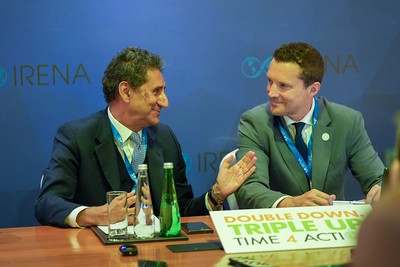The Global Renewables Alliance (GRA) has called on the world to expedite the delivery of renewable energy, in line with the commitments made at COP28 last year, which aimed to triple global renewable capacity to over 11,000 gigawatts.
This week the ‘Global Time for Action’ campaign was launched on the sidelines of the 14th International Renewable Energy Agency (IRENA) Assembly of the in Abu Dhabi, United Arab Emirates.
Global Renewables Alliance CEO, Bruce Douglas told the media in a press conference in Abu Dhabi, they see the opportunity now is to combine long-term planning with urgent short-term actions.
“So, the time to 2030 is short, less than seven years, and we need to act now. So, we as the Alliance are launching several initiatives here at the assembly, but also throughout the rest of the year.
“We as the industry stand ready to deliver. We think it’s possible to scale to 11 000 gigawatts. We have consistently broken records worldwide for the last few decades in renewable deployment. Last year alone, it surged by over 30 percent. However, at that current pace, renewable capacity will fall far short of that tripling ambition. So, we’re now calling on governments to take action,” he said.
Douglas warned that if this was not done the world risked moving further away from the 1.5ºC climate pathway and missing the huge opportunities that benefits of scaled-up renewables, including socio-economic development and energy security, particularly in emerging markets and developing economies.
Key actions advocated by the Alliance include addressing financing, permitting, grid infrastructure, and supply chains.
“So just four of the main actions that we’re calling for on financing on permitting on grids and supply chains. Financing is, in our opinion, the main priority and, especially, mobilising the US$10 trillion of finance required cumulative by 2030. And especially moved to emerging markets,” he said.
In addition to the campaign launch, the Global Renewables Alliance introduced a finance advisory group to facilitate discussions among public and private finance institutions, guided by IRENA’s expertise, on the principles and requirements for scaling up financing of US$10 trillion.
The Alliance’s website outlined a nine-point plan to accelerate permitting processes, addressing issues such as standardisation, digitalisation, and streamlining administrative burdens across jurisdictions.
“It still takes longer to permit a wind farm than it does to build a wind farm in many jurisdictions around the world. There are also thousands of gigawatts around the world waiting in connections in permitting queues.
“That’s in addition to the grid connection queues, which is more gigawatts. So, there’s a huge potential there at low cost to unblock renewable deployment through permitting. Included in the nine-point plan are things like standardisation, one-stop shops, digitalisation and processes.”
“As an industry in the development industry it faced different permitting guidelines in each jurisdiction. So, if one was developing in multiple countries, one was facing a challenge in terms of that administrative burden, which could be simplified, he said.
Director-General of IRENA, Francesco La Camera welcomed the call for action, stressing the importance of a concerted effort to transition away from fossil fuels
He highlighted the need for developing countries to receive support similar to the Marshall Plan to facilitate the development of renewable energy infrastructure, citing its potential to generate employment and revenue.
La Camera said it was important to have a strong voice for accelerating the transition of energy away from fossil fuels.














